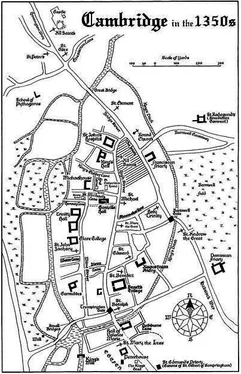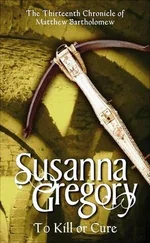‘Made an illegal loan, you mean?’ asked Tulyet doubtfully. ‘Ailred is an honest fellow. I do not see him breaking our rules – especially for Norbert, who would have spent the money on his own pleasures.’
‘Well, we shall have to ask Ailred himself,’ said Michael, draining the wine in Bartholomew’s goblet as he prepared to leave. ‘And we shall ask him about the murdered Chepe fishmonger John Fiscurtune, too, since I have reason to believe he and Ailred were related.’
Bartholomew and Tulyet gazed at him in astonishment, and Michael’s face became smug when he saw he had startled them.
‘Fiscurtune?’ asked Tulyet. ‘The man Turke killed, whom I told you last night that I had met many years ago?’
Bartholomew had forgotten Michael’s mention of a previous association between Tulyet and the dead fishmonger. He raised his eyebrows questioningly, and Tulyet spread his hands to indicate he knew little of interest.
‘I met Fiscurtune before the Death, in the market at Chepe. He sticks in my mind for two reasons: first, because he was unforgivably rude, and second, because he was totally devoid of teeth. Fortunately, an excess of gums rendered his speech indistinct, so most folk could not understand him. But I am not surprised someone tired of his offensive manners and murdered him.’
‘We should see Ailred, Matt, and ask him about Fiscurtune. I think he has met the fangless fishmonger far more recently than Dick has done.’
‘How do you know that?’ asked Tulyet, surprised. ‘Fiscurtune had no association with Cambridge as far as I know. He has certainly not been here recently, because I assure you I would have noticed him.’
‘I came across the information last night, when Matt was visiting Edith,’ said Michael, pleased with himself. ‘I trawled through some University documents and discovered that Ailred hails from near Lincoln – not Lincoln itself, but a small village just outside it.’
‘We know that,’ said Bartholomew. ‘It is no secret: he is very proud of the fact that he is a Lincolnshire man.’
‘The name of his manor is Fiscurtune,’ announced Michael momentously.
‘It is a common name,’ warned Tulyet. ‘I imagine any village with some kind of fishing industry may have taken the Saxon word “fisc” for fish, and added “tun” for village or manor. You cannot connect Ailred with your dead fishmonger on that evidence alone.’
‘I do not believe in coincidences,’ said Michael pompously and untruthfully. ‘Anyway, when I learned where Ailred spent his early years, I visited Sheriff Morice, who gave me permission – for a price – to refer to the taxation lists compiled in the days of the Conqueror. They are a good source of information about places in obscure parts of the kingdom.’
‘Lincolnshire is not obscure,’ said Bartholomew, amused by Michael’s description.
‘Morice asked for money before he let you see Domesday?’ asked Tulyet, horrified. ‘It is just as well he is not investigating Norbert’s death, because I do not want to be presented with a bill for his labours, as well as with a killer!’
‘It is your fault for resigning,’ retorted Michael unsympathetically. ‘But I learned from Domesday that Fiscurtune boasts three and a half fisheries.’
‘Fisheries,’ mused Bartholomew. ‘Fiscurtune was a fishmonger, and so was Turke. Now we learn that Ailred hails from a village with fisheries. Perhaps there is a connection here.’
‘Fiscurtune village is small,’ Michael went on. ‘So, assuming I am right, and the murdered John Fiscurtune and Ailred hail from the same settlement, then it follows that they must have known each other. Indeed, I feel they knew each other rather well. Was there any physical resemblance between Fiscurtune and Ailred, Dick?’
‘Fiscurtune had no teeth,’ said Tulyet apologetically. ‘It changed his face so much it is impossible to say.’ His expression became thoughtful. ‘However, now that I think about it, I do vaguely recall Fiscurtune mentioning a kinsman who was the head of a Cambridge hostel.’
‘Ha!’ exclaimed Michael with immense satisfaction.
Bartholomew walked briskly towards Ovyng Hostel, urging Michael to hurry. He sensed that Ailred had the answers to many questions, and wanted to speak to him as soon as possible. Michael puffed along behind him, growing more breathless and red-faced with every step. The thaw was continuing apace, and the town was a morass of sticky slush and sloppy, ice-spangled puddles. Snow was dropping from roofs in clots, and Bartholomew paused for a few moments to excavate a cat that was buried by a sudden fall. It clawed him when it was freed, and raced down one of the darker runnels, as if mortified by its sodden fur and bedraggled appearance.
‘There is Robin of Grantchester,’ said Bartholomew, pointing to a hunched figure that was making its way uncertainly down the High Street. ‘Robin!’
The surgeon leapt in alarm and started to run. It was an instinctive reaction, and something he often did when someone hailed him. It usually meant he had lost a patient and was afraid the deceased’s family were out for revenge.
‘Oh, it is you,’ said Robin, relieved when he saw it was Bartholomew who had caught his arm and arrested his desperate flight. ‘I thought it was a relative of Dunstan and Athelbald.’
‘Why would they chase you? You did not treat them – I did.’
‘They are both dead, and people tend to associate me with deaths, even though I am not usually there when they happen.’ Bartholomew knew that was true: Robin’s patients died of fright, pain or poisoned blood days or hours after he had finished his grisly business with his rusty knives. ‘Fifteen years ago I extracted a nail from Dunstan’s hand. I thought his kinsmen might believe that brought about his demise.’
‘Dympna,’ said Michael, pronouncing the name with relish. ‘Tell me about Dympna.’
Robin’s small eyes narrowed. ‘What are you talking about? I know no one of that name.’
‘It is a money-lending charity,’ said Bartholomew, watching Robin shift and turn uneasily, like a cornered rat. ‘And you are one of its four members.’
‘Clippesby,’ said Robin in disgust. ‘I had a feeling he was eavesdropping when I confided in Helena. She is my only true friend, and I often talk to her when I am lonely or have enjoyed a little wine and wish for a companion who will listen without interrupting.’
‘She sounds like a saint,’ said Michael. ‘But I do not know her.’
‘My pig,’ said Robin. ‘A man needs friendship, and there is none better than that offered by an animal. They are loyal and do not judge you. Clippesby feels the same way, and likes to spend time with the horses in the stables of the Gilbertine Friary, near my house. Doubtless he heard me confiding in Helena then.’
‘And he assumed the disembodied voice came from the horses,’ said Bartholomew, amused. ‘I wondered why information from his animal friends is so often accurate. It is not because the animals speak to him, but because he overhears other people’s conversations.’
‘It is almost impossible to know he is there,’ said Robin disapprovingly. ‘He sits still and quiet for so long you think you are alone, and then he hears your innermost secrets.’ A horrified expression twisted his face. ‘He did not mention Mayor Horwood’s goat, did he? I would not like that bandied about the town!’
‘Fortunately not,’ said Michael with a shudder. ‘But what can you tell us about Dympna? Did it ever make a loan to Norbert?’
‘Of course not,’ said Robin scornfully. ‘The money is used for pious and deserving cases, not for folk who will spend it on themselves. I have my own ideas about recipients, of course, but the other members seldom listen to me. They never lend money to the cases I bring before them.’
Читать дальше












